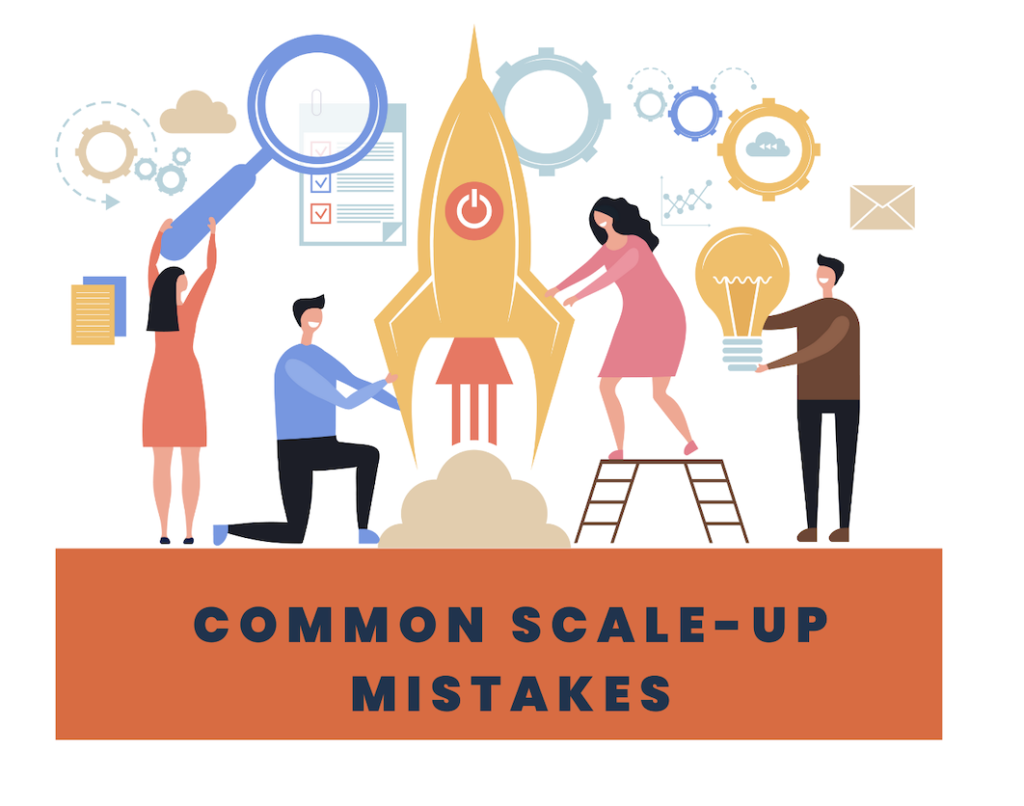
Scaling up a startup is a critical phase in its growth journey. It can be an exciting and challenging time for founders and their teams. However, there are several common mistakes that startups often make during this phase that can have serious consequences. In this blog post, we will discuss some of the most common scale-up mistakes that startups should avoid.
I. Failing to Define a Clear Growth Strategy
One of the most common mistakes startups make when scaling up is not having a clear growth strategy. This can lead to unfocused efforts, wasted resources, and missed opportunities. A growth strategy should identify the target market, product/service differentiation, and key metrics to track progress towards growth goals. Without a clear growth strategy, a startup may be unable to measure the effectiveness of its efforts, making it difficult to identify areas of improvement.
II. Neglecting the Importance of Culture
As a startup grows, it is essential to build and maintain a strong organizational culture. However, many startups neglect this aspect of scaling up, which can lead to a negative impact on employee morale, productivity, and turnover rates. A strong culture fosters a sense of belonging, purpose, and shared values, which are vital for attracting and retaining top talent. Startups should prioritize building and maintaining a positive culture, even as they grow.
III. Scaling Too Quickly
Many startups make the mistake of scaling too quickly, without adequate preparation. Rapid growth can put a strain on a startup’s resources, infrastructure, and operations, leading to poor customer experience, decreased quality, and decreased employee satisfaction. Startups should focus on scaling sustainably, ensuring that they have the necessary resources, infrastructure, and processes in place to support growth.
IV. Failing to Delegate Responsibilities
As a startup grows, it becomes increasingly important to delegate responsibilities to different team members. However, many founders struggle with delegating tasks, which can lead to burnout, micromanagement, and a lack of trust in their team. Delegating responsibilities allows the founder to focus on high-level strategy, while empowering their team members to take ownership of their work and contribute to the startup’s growth.
V. Not Being Customer-Centric
As a startup scales up, it is easy to become focused on internal operations and lose sight of the customer’s needs. However, startups that are not customer-centric risk losing their competitive edge and failing to meet the evolving needs of their target market. Startups should prioritize understanding their customers’ needs, pain points, and preferences, and use this information to inform their growth strategy and product/service development.
VI. Accumulated Technical Debt
One common mistake that companies make when scaling up is accumulating debilitating technical debt. Technical debt refers to the cost that arises from choosing a suboptimal solution or approach when developing a system, which may require further effort and resources to fix later on. As companies grow and their systems become more complex, technical debt can accumulate rapidly, leading to slow and unstable systems, increased downtime, and higher maintenance costs. In some cases, the technical debt can become so significant that it can hinder further growth and innovation. To avoid this mistake, companies must prioritize addressing technical debt as part of their scaling strategy, making sure that they invest in developing robust and scalable systems that can adapt to their evolving needs.
VII. Insufficient GTM strategy
One common mistake that scaleup companies often make is premature acceleration of their go-to-market (GTM) strategy. While it’s important for a company to scale and reach new markets quickly, doing so before having a solid product-market fit can lead to significant problems. Prematurely accelerating the GTM strategy can result in wasted resources and high customer acquisition costs, leading to difficulties in generating revenue and sustaining growth in the long run. It’s crucial for scaleup companies to conduct thorough market research and understand their customers’ needs before investing in a GTM strategy. Rushing to expand before fully validating the product-market fit can ultimately hinder the company’s growth potential and success.
VIII. Lack of focus and alignment.
One of the most common mistakes that scaleups make is a lack of focus and alignment. When companies are in their early stages, they often have a laser-sharp focus on a particular product or service. However, as they grow and expand, they may begin to diversify their offerings or pursue new markets, which can lead to a loss of focus and alignment across the organization. This lack of focus and alignment can result in teams working at cross purposes, unclear priorities, and a loss of momentum. It’s essential for scaleups to maintain a clear sense of purpose and alignment around their core mission, and to communicate this effectively to all employees, partners, and stakeholders. Without this focus and alignment, scaleups risk losing their competitive edge and failing to achieve their full potential.
Scaleups, or rapidly growing companies, often face challenges in maintaining focus and alignment across their teams as they expand. This is where OKRs (Objectives and Key Results) can be a valuable tool. OKRs are a goal-setting framework that helps organizations set clear objectives and track progress towards achieving them. They provide a structured approach to goal-setting, creating alignment and focus throughout the organization. For scaleups, OKRs can help prioritize key areas for growth, ensure everyone is working towards the same goals, and provide a clear way to measure progress. By using OKRs, scaleups can stay agile and adaptable while still achieving their ambitious growth goals.
New to OKRs? Start with the OKR fun course
Need more OKR examples for your business? Reach more OKR Examples
Scaling up a startup is an exciting phase, but it is important to avoid common mistakes that can hinder growth and success. By prioritizing a clear growth strategy, a positive culture, sustainable growth, delegation, and customer-centricity, startups can avoid these mistakes and position themselves for long-term success.
